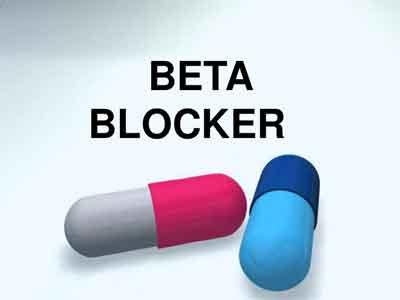- Home
- Editorial
- News
- Practice Guidelines
- Anesthesiology Guidelines
- Cancer Guidelines
- Cardiac Sciences Guidelines
- Critical Care Guidelines
- Dentistry Guidelines
- Dermatology Guidelines
- Diabetes and Endo Guidelines
- Diagnostics Guidelines
- ENT Guidelines
- Featured Practice Guidelines
- Gastroenterology Guidelines
- Geriatrics Guidelines
- Medicine Guidelines
- Nephrology Guidelines
- Neurosciences Guidelines
- Obs and Gynae Guidelines
- Ophthalmology Guidelines
- Orthopaedics Guidelines
- Paediatrics Guidelines
- Psychiatry Guidelines
- Pulmonology Guidelines
- Radiology Guidelines
- Surgery Guidelines
- Urology Guidelines
Some heart attack patients may not benefit from beta blockers: JACC

New research challenges established medical practice that all heart attack patients should be on beta blockers.
The study -- by a research team at the University of Leeds -- looked at patients who had a heart attack but did not suffer heart failure -- a complication of a heart attack where the heart muscle is damaged and ceases to function properly.
It found that heart attack patients who did not have heart failure did not live any longer after being given beta blockers -- yet around 95% of patients who fall into this category end up on the medication.
Beta blockers are a powerful group of medicines which decrease the activity of the heart and lower blood pressure. They are commonly prescribed after a heart attack, but they can have unwanted side-effects for some patients such as dizziness and tiredness.
Not all people who have their first heart attack have heart failure. Patients with a heart attack and heart failure need to be on beta blockers because the drugs help the damaged heart to work more effectively.
The University of Leeds investigation, though, focused on those patients with heart attack who did not have heart failure but were still prescribed beta blockers.
The study wanted to see if being on beta blockers made any difference to the chances of these patients being alive one year after their heart attack.
The research -- published in the Journal of the American College of Cardiology -- raises the possibility that the drugs are being over prescribed, and may burden patients and the NHS with unnecessary medicine costs.
UK medical guidelines recommend that beta blockers should be prescribed to all patients who have had a heart attack -- irrespective of whether they have heart failure.
The University of Leeds research team analysed data from the UK's national heart attack register which collects information on people hospitalised following a heart attack. They looked at anonymised data from more than 179,000 patients who had a heart attack without heart failure. When investigators compared death rates within a year of the patients suffering a heart attack, they found no statistical difference between those who'd been prescribed the drugs and those who had not.
Dr Marlous Hall, lead investigator and senior epidemiologist at the Leeds Institute of Cardiovascular and Metabolic Medicine, said: "If you look at the patients who had a heart attack but not heart failure -- there was no difference in survival rates between those who had been prescribed beta blockers and those that had not."
"This was an observational study based on robust statistical analysis of large scale patient data. What we need now is a randomised patient trial. We were investigating one outcome -- did beta blockers increase a patient's chances of survival? A trial would allow researchers to substantiate these findings and also look at other outcomes, such as whether beta blockers prevent future heart attacks. This work would have implications for personalising medications after a heart attack."
Chris Gale, Professor of Cardiovascular Medicine at the University of Leeds and Consultant Cardiologist at York Teaching Hospital Trust, said: "There is uncertainty in the evidence as to the benefit of beta-blockers for patients with heart attack and who do not have heart failure. This study suggests that there may be no mortality advantage associated with the prescription of beta-blockers for patients with heart attack and no heart failure. A necessary next step is the investigation of beta-blockers in this population in a randomised controlled trial."
The British Heart Foundation says there are around 950,000 people in the UK who have survived a heart attack.

Disclaimer: This site is primarily intended for healthcare professionals. Any content/information on this website does not replace the advice of medical and/or health professionals and should not be construed as medical/diagnostic advice/endorsement or prescription. Use of this site is subject to our terms of use, privacy policy, advertisement policy. © 2020 Minerva Medical Treatment Pvt Ltd